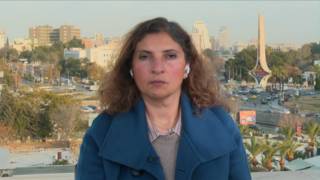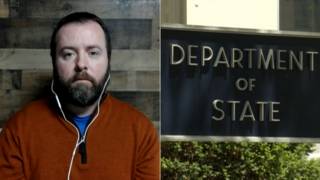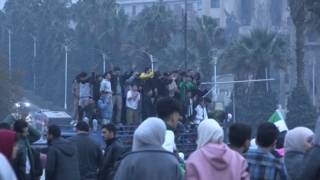This content originally appeared on Radio Free Asia and was authored by Radio Free Asia.
-
This content originally appeared on Laura Flanders & Friends and was authored by Laura Flanders & Friends.This post was originally published on Radio Free.
-
The Myanmar military has razed villages north of the city of Mandalay after insurgents who had been threatening to attack the country’s second biggest city from the area withdrew, a research group and residents said, apparently aiming to ensure the area cannot be re-occupied.
Forces of the junta that seized power in 2021 have been on the back foot for most of this year, losing large amounts of territory to ethnic minority insurgents, while allied pro-democracy fighters have made unprecedented gains in central areas including the Mandalay region.
But the junta has since November mobilized forces for offensives in Mandalay as well as the central areas of Sagaing and Magway, helped by ceasefires that two main insurgent groups in Shan state struck after they came under pressure from neighboring China to make peace.
The research group Data for Myanmar said junta forces had razed eight villages in Madaya township, just 25 kilometers (15 miles) to the north of Mandalay city, and one in nearby Thabeikkyin township.
Residents said large deployments of troops were putting everything to the torch in the villages that have mostly been abandoned by their thousands of residents.
“Villages are being burned until everything is gone. Troops go to the villages one after another and burn everything,” a resident of Madaya township told Radio Free Asia on Friday.
Residents were too frightened to think about going back, the resident said.
“No one can get close to check on their homes because the troops are still there,” said the resident who declined to be identified in fear of reprisals.
The villages had been occupied by members of pro-democracy militias known as People’s Defense Forces, or PDFs, that sprang up after the 2021 coup to fight to end military rule in collaboration with ethnic minority insurgents based in border regions.
PDFs have attacked the military relentlessly in central areas this year, taking over territory even on the approaches to Mandalay and the nearby garrison town of Pyin Oo Lwin, home to the military’s Defense Forces Academy.
But the military has been pushing back in the dry season, which began in November and traditionally favors the army that can transport its heavy equipment and supplies to more remote regions on dried-out roads.
Data for Myanmar said in a report on Thursday that the eight villages destroyed in the west of Madaya township included Mway Ku Toet Seik, Mway Thit Taw Yone, Mway Pu Thein, Thu Htay Kone and Mway Sin Kone.
In Thabeikkyin township, troops torched hundreds of homes in Twin Nge village, the group said.
PDF fighters had abandoned all of their positions in the villages before the troops began the sweep, residents said.
RFA tried to contact the spokesman for the military in the Mandalay region, Thein Htay, to ask about the situation but he did not respond.
Data for Myanmar said in November that 105,314 houses had been burned down across the country since the 2021 coup.
The conflict is causing a humanitarian crisis, compounded by disastrous flooding this year.
The United Nations says about a third of Myanmar’s population, or 18.6 million people, are in humanitarian need with children bearing the brunt of the crisis with 6 million of them in need as a result of displacement, food insecurity and malnutrition.
Edited by RFA Staff.
This content originally appeared on Radio Free Asia and was authored by RFA Burmese.This post was originally published on Radio Free.
-
This content originally appeared on Democracy Now! and was authored by Democracy Now!.This post was originally published on Radio Free.
-
This content originally appeared on Democracy Now! and was authored by Democracy Now!.This post was originally published on Radio Free.
-

We go to Damascus for an update on the state of affairs in Syria after the surprise collapse of the long-reigning Assad regime, with BBC Middle East correspondent Lina Sinjab. She is reporting in Syria for the first time in over a decade, after she was forced to flee the country in 2013. She relays the “sense of freedom and joy” now present on the streets of Damascus, where ordinary Syrians, for the first time in generations, “feel that they are liberated and they are proud of where they are today.” Current estimates put the number of forced disappearances under the Assad government at 300,000 likely tortured in prisons and buried in mass graves. We discuss Syria’s new transitional government, led by the Islamist group Hayat Tahrir al-Sham, and whether it can fulfill its promises of inclusion and accountability for all Syrians. “There’s no way for peace and stability to happen in Syria without a prosecution, without a legal system that will hold those who have blood on their hands accountable, for the sake of reconciliation in the country,” says Sinjab.
This content originally appeared on Democracy Now! and was authored by Democracy Now!.This post was originally published on Radio Free.
-

After a 15-year career in the Foreign Service, Michael Casey resigned from the State Department in July over U.S. policy on Gaza and is now speaking out publicly for the first time. He was deputy political counselor at the United States Office for Palestinian Affairs in Jerusalem for four years before he left. Casey says he resigned after “getting no action from Washington” for his recommendations on humanitarian actions for Palestinians and toward a workable two-state solution. “We don’t believe Palestinian sources of information,” Casey says about U.S. policymakers. “We will accept the Israeli narrative over all others, even if we know it’s not correct.” He also discusses what to expect for Gaza under the incoming Trump administration.
This content originally appeared on Democracy Now! and was authored by Democracy Now!.This post was originally published on Radio Free.
-
Read about tsunami preparedness 20 years later at BenarNews
Faced with the daunting task of reclaiming neighborhoods, beachfront properties and areas around mosques, repairs began quickly in sections of Indonesia and Thailand devastated by the deadly Dec. 26, 2004 Indian Ocean Tsunami.
A 9.1 magnitude earthquake struck in waters off Sumatra, generating a giant tsunami where waves topped over 160 feet (48.7 meters) in Indonesia’s Aceh province.
After the waters finally calmed down, the death toll globally climbed to about 230,000, including about 167,000 in Aceh, according to the U.S. National Oceanic and Atmospheric Administration, which estimated damage at U.S. $13 billion.
Within a few years, life returned to a semblance of normal because of efforts to reclaim and rebuild what was lost in the two countries hit hard by the wall of water. In many places, few signs of the destruction are visible in 2024.
Those efforts are captured in a series of before-and-after photos:
Top: Motorcyclists ride past debris and a fire in Meulaboh, Aceh province, Indonesia, in the aftermath of the Indian Ocean Tsunami, Jan. 9, 2005. Below: The same street is seen on Nov. 17, 2024. (Philippe Desmazes & Chaideer Mahyuddin/AFP)Left: People salvage belongings amid rubble along a street in Banda Aceh, Indonesia, just days after the tsunami, Dec. 29, 2004. Right: The same street on Nov. 25, 2024. (Bay Ismoyo & Chaideer Mahyuddin/AFP)Top: The Indian Ocean Tsunami left vehicles stacked on top of each other on Patong Street in Phuket, Thailand, Dec. 28, 2004. Below: The same street on Nov. 18, 2024. (Manan Vatsyayana & Ali Ozluer/AFP)Top: Construction equipment is used to remove debris from a street in Phuket, Thailand, following the tsunami, Dec. 28, 2004. Bottom: The street seen on Nov. 18, 2024. (Romeo Gacad & Manan Vatsyayana/AFP)Left: People walk through debris created by the tsunami at the Baiturrahman Grand Mosque in Banda Aceh, Indonesia, Dec. 28, 2004. Right: The mosque as seen on Nov. 27, 2024. (Bay Ismoyo & Chaideer Mahyuddin/AFP)Top: Damage from the Indian Ocean Tsunami is seen in the courtyard of the Orchid resort at Khao Lak, Thailand, on Dec. 29, 2004. Bottom: The same location on Dec. 24, 2009. (Saeed Khan & Christophe Archambault/AFP)Left: Nearly everything around a mosque in Aceh province, Indonesia, was destroyed by the December 2004 tsunami, Jan. 15, 2005. Right: New houses surround it on Dec. 8, 2006. (AFP)Top: Wreckage from the tsunami is seen in Meulaboh, a city in Aceh province, Indonesia, Dec. 31, 2004. Bottom: The same area is seen on Dec. 4, 2005. (Agus & Jewel Samad/AFP)See a version of this gallery on BenarNews — an RFA-affiliated online news organization.
This content originally appeared on Radio Free Asia and was authored by BenarNews staff.This post was originally published on Radio Free.
-
This content originally appeared on Democracy Now! and was authored by Democracy Now!.This post was originally published on Radio Free.
-
Read RFA coverage of this story in Chinese.
Authorities in China are going after the country’s richest celebrity live-streamers, punishing two high-profile influencers for failing to pay up, at a time when government coffers are looking bare and many are struggling.
The Taxation Bureau named and shamed Shanghai-based Wang Zibai, who has 2.92 million followers, for “concealing his income” from tax officials, evading taxes to the tune of 7.49 million yuan (US$1.26 million), state media reported.
He was slapped with a tax bill, fines and late payment fees totaling 13.3 million yuan (US$1.82 million), state broadcaster CCTV reported on Dec. 19.
Cash-strapped local authorities across China are struggling to pay public employees, as a burst property bubble and dwindling exports depict an increasingly grim outlook for the world’s second-largest economy, meaning they need to cast a wider net when it comes to tax revenues, analysts told Radio Free Asia in recent interviews.
Authorities in the southeastern port city of Xiamen also accused celebrity live-streamer Cheng Hu, who has 5 million followers, of concealing the income from livestream sales commission to the tune of 1.21 million yuan (US$165,800) in unpaid taxes, the report said.
Cheng was forced to pay up the taxes owed, fines and late payment charges totaling 1.99 million yuan (US$272,700), it said.
Investigations
Shanghai tax inspectors started an investigation after checking out Wang’s channel, and figuring out that the volume of goods he was selling there was inconsistent with his reported income, the People’s Daily online finance channel reported on Dec. 19.
“The inspectors ran a comprehensive analysis of … pricing, categories and clicked links to third-party merchants, and concluded that he was earning a considerable amount of commission and under-reporting his income,” the paper said.
The team requested his family’s bank details, and found large amounts of money being deposited in Wang’s mother’s account, it said.
In Xiamen, inspectors thought it strange that Cheng claimed not to have earned over the personal annual tax threshold between 2020 and 2022, despite being a live-streamer with 5 million followers, the paper said.
RELATED STORIES
EXPLAINED: How China hopes to kickstart its flagging economy
EXPLAINED: How much hidden debt do local governments in China carry?
Chinese Actress Makes Public Apology For Tax Evasion After ‘Disappearance’
“Cheng Hu did not set up account books as required by the law, and only used a notebook to briefly record the details of income and expenditure, and the handwriting was smudged and blurry, making it almost impossible to confirm his true financial situation,” the People’s Daily said.
“As public figures, live streaming practitioners should establish correct values, legal and professional values, fulfill their tax obligations in accordance with the law, and set a good example for society,” the paper said.
New source of tax revenue
According to financial commentator Cai Shenkun, online platforms are replacing the property market as an important source of tax revenue for local governments.
“Digital platforms have developed rapidly in recent years … and some anchors have made a lot of money,” Cai said. “Now that fiscal sources are increasingly tight, taxation may be further increased and these online platforms will be fully supervised.”
He said local governments across China are still struggling to pay civil servants and teachers, even in first-tier cities like Guangzhou.
“Teachers and civil servants are actually seeing significant salary cuts, to an unprecedented level,” Cai said.
An e-commerce insider who gave only the surname Liu for fear of reprisals said the story will likely fuel public anger at a time of rampant inequality in a flagging economy.
“The government is going to be finding ways to claw back as much revenue as possible, whether currently or retrospectively,” Liu said.
But companies may not have the cash to pay up, he added.
“A lot of Chinese companies and institutions can’t even pay their wages,” Liu said.
Digital platforms
Financial commentator Zheng Xuguang said the authorities are also targeting digital platforms.
“They’re targeting digital platform operators and staff,” Zheng said. “When platforms get to a certain size and their income is quite substantial, they now mandate tax audits on platform operators, including tax-related information reporting, such as who you work with, how many people, and so on.”
He said the government will likely hold off from cracking down on tax avoidance at the lowest income levels for the time being.
Translated by Luisetta Mudie. Edited by Roseanne Gerin.
This content originally appeared on Radio Free Asia and was authored by Qian Lang for RFA Mandarin.This post was originally published on Radio Free.
-
This content originally appeared on Democracy Now! and was authored by Democracy Now!.This post was originally published on Radio Free.
-

As foreign powers look to shape Syria’s political landscape after the toppling of the Assad regime, the country’s Kurdish population is in the spotlight. Turkish President Recep Tayyip Erdoğan continues to threaten the Syrian Kurdish YPG militia, which Turkey regards as an extension of the Kurdistan Workers’ Party militants who have fought an insurgency against the Turkish state for 40 years. Turkey’s foreign minister recently traveled to Damascus to meet with Syria’s new de facto ruler Ahmed al-Sharaa, the head of the Islamist group HTS. “Turkey is a major threat to Kurds and to democratic experiments that Kurds have been implementing in the region starting in 2014,” says Ozlem Goner, steering committee member of the Emergency Committee for Rojava, who details the persecution of Kurds, the targeting of journalists, and which powerful countries are looking to control the region. “Turkey, Israel and the U.S. collectively are trying to carve out this land, and Kurds are under threat.”
This content originally appeared on Democracy Now! and was authored by Democracy Now!.This post was originally published on Radio Free.
-
TAIPEI, Taiwan – China has announced “countermeasures” against Canadian groups and individuals two weeks after Canada imposed sanctions on senior Chinese officials in early December over human rights concerns.
China’s Ministry of Foreign Affairs said in a press release on Saturday that it was freezing the assets in China of Canada’s Uyghur Rights Advocacy Project and the Canada Tibet Committee.
The ministry, citing China’s Anti-Foreign Sanctions Law, said organizations and individuals in China were prohibited from conducting transactions or cooperating with those groups. They would also be barred from travel to China, including Hong Kong and Macau.
The ministry in its announcement did not refer directly to Canada’s Dec. 10 sanctions on eight former and current senior Chinese officials over what Canada said was their involvement in grave human rights violations in Tibet and Xinjiang and against followers of the Falun Gong spiritual sect.
At the time, the Chinese ministry said Canada “smeared and slandered” China and interfered in its internal affairs with its “illegal” sanctions and “clumsy political theatrics.”
Canada is not alone. Western governments have sanctioned China over human rights abuses in Xinjiang and Tibet, citing reports of mass detentions, forced labor, cultural suppression of Uyghurs and Tibetans, and crackdowns on religious and political freedoms. These measures aim to pressure China to uphold international human rights standards.
The United States, for instance, had earlier imposed sanctions on all eight of the Chinese officials that Canada sanctioned, for their connections to serious human rights violations.
Among the most prominent individuals sanctioned by the North Americans was Chen Quanguo, who served as the Chinese Communist Party Committee Secretary of the Tibet Autonomous Region from 2011 to 2016 and the Xinjiang Uyghur Autonomous Region from 2016 to 2021.
Another sanctioned official is Wu Yingjie, who was the Communist Party Secretary of Tibet from 2016 to 2021.
RELATED STORIES
Canada sanctions 8 Chinese officials for human rights violations
15 countries call on China to release Uyghur and Tibetan prisoners
China demolishes prominent Xinjiang building owned by Uyghur activist in US
Shane Yi, a researcher with the non-governmental organization Chinese Human Rights Defenders said China’s sanctions against the Canadian groups suggested they were having some impact.
“This not only underscores China’s intent to escalate its suppression efforts but also demonstrates the growing impact of these organizations’ work,” Yi said.
China and Canada have had particularly fraught relations in recent years, largely stemming from the 2018 arrest in Canada of a senior executive of China’s technology giant Huawei.
The executive, Chief Financial Officer Meng Wanzhou, was detained in Canada for nearly three years pending U.S. extradition hearings related to suspicion of illegal business dealings with Iran. She flew home to China in 2021 after reaching an agreement with U.S. prosecutors.
Edited by Taejun Kang.
This content originally appeared on Radio Free Asia and was authored by Alan Lu for RFA.This post was originally published on Radio Free.
-
TAIPEI, Taiwan – China has announced “countermeasures” against Canadian groups and individuals two weeks after Canada imposed sanctions on senior Chinese officials in early December over human rights concerns.
China’s Ministry of Foreign Affairs said in a press release on Saturday that it was freezing the assets in China of Canada’s Uyghur Rights Advocacy Project and the Canada Tibet Committee.
The ministry, citing China’s Anti-Foreign Sanctions Law, said organizations and individuals in China were prohibited from conducting transactions or cooperating with those groups. They would also be barred from travel to China, including Hong Kong and Macau.
The ministry in its announcement did not refer directly to Canada’s Dec. 10 sanctions on eight former and current senior Chinese officials over what Canada said was their involvement in grave human rights violations in Tibet and Xinjiang and against followers of the Falun Gong spiritual sect.
At the time, the Chinese ministry said Canada “smeared and slandered” China and interfered in its internal affairs with its “illegal” sanctions and “clumsy political theatrics.”
Canada is not alone. Western governments have sanctioned China over human rights abuses in Xinjiang and Tibet, citing reports of mass detentions, forced labor, cultural suppression of Uyghurs and Tibetans, and crackdowns on religious and political freedoms. These measures aim to pressure China to uphold international human rights standards.
The United States, for instance, had earlier imposed sanctions on all eight of the Chinese officials that Canada sanctioned, for their connections to serious human rights violations.
Among the most prominent individuals sanctioned by the North Americans was Chen Quanguo, who served as the Chinese Communist Party Committee Secretary of the Tibet Autonomous Region from 2011 to 2016 and the Xinjiang Uyghur Autonomous Region from 2016 to 2021.
Another sanctioned official is Wu Yingjie, who was the Communist Party Secretary of Tibet from 2016 to 2021.
RELATED STORIES
Canada sanctions 8 Chinese officials for human rights violations
15 countries call on China to release Uyghur and Tibetan prisoners
China demolishes prominent Xinjiang building owned by Uyghur activist in US
Shane Yi, a researcher with the non-governmental organization Chinese Human Rights Defenders said China’s sanctions against the Canadian groups suggested they were having some impact.
“This not only underscores China’s intent to escalate its suppression efforts but also demonstrates the growing impact of these organizations’ work,” Yi said.
China and Canada have had particularly fraught relations in recent years, largely stemming from the 2018 arrest in Canada of a senior executive of China’s technology giant Huawei.
The executive, Chief Financial Officer Meng Wanzhou, was detained in Canada for nearly three years pending U.S. extradition hearings related to suspicion of illegal business dealings with Iran. She flew home to China in 2021 after reaching an agreement with U.S. prosecutors.
Edited by Taejun Kang.
This content originally appeared on Radio Free Asia and was authored by Alan Lu for RFA.This post was originally published on Radio Free.
-
This content originally appeared on Radio Free Europe/Radio Liberty and was authored by Radio Free Europe/Radio Liberty.This post was originally published on Radio Free.
-
This content originally appeared on The Real News Network and was authored by The Real News Network.This post was originally published on Radio Free.
-
This content originally appeared on Democracy Now! and was authored by Democracy Now!.This post was originally published on Radio Free.
-
This content originally appeared on Radio Free Europe/Radio Liberty and was authored by Radio Free Europe/Radio Liberty.This post was originally published on Radio Free.
-

We speak with The Nation's Chris Lehmann about President-elect Donald Trump's escalating attacks on the press and how major media figures and institutions are “capitulating preemptively” to the pressure. ABC News recently settled a defamation suit brought by Trump by making a $15 million donation to his future presidential library, despite experts saying the case was easily winnable. Trump is also suing The Des Moines Register for publishing a poll before the election that showed him losing to Vice President Kamala Harris. “What’s happening is a very clear pattern in Trump’s public life,” says Lehmann. “This is a show of power.”
This content originally appeared on Democracy Now! and was authored by Democracy Now!.This post was originally published on Radio Free.
-
This content originally appeared on Democracy Now! and was authored by Democracy Now!.This post was originally published on Radio Free.
-
TAIPEI, Taiwan – An annual forum between the cities of Shanghai and Taipei that is meant to promote dialogue across the Taiwan Strait has opened about six months late after tensions including unprecedented Chinese sabre-rattling raised doubts that it could be organized this year.
The Shanghai-Taipei City Forum opened in the self-ruled island’s capital on Monday with a visit by Hua Yuan, the deputy mayor of China’s largest city, presided over by Taipei’s mayor, Chiang Wan-an.
Chiang, in his opening remarks, acknowledged the recent tensions between Beijing and the island it regards as its territory and has vowed to take over by force if necessary.
Just last week, China’s military deployed what one senior Taiwan official called a “staggering” array of ships and aircraft in the seas and skies around the island in a show of force that analysts said could be aimed at setting red lines for the incoming administration in the United States, Taiwan’s main ally.
“I always say that the more tense and difficult the moment, the more we need to communicate,” Chiang told the visiting Chinese delegates at the forum.
Chiang called for talks.
“More dialogue and less confrontation; more olive branches of peace and less sour grapes of conflict. More lights from fishing boats to adorn the sunset; less of the howls of ships and aircraft,” said Chiang.
Chiang, a member of Taiwan’s main opposition party, the Kuomintang, which traditionally advocates for closer cross-strait ties while rejecting accusations it is pro-Beijing, is widely seen as a possible presidential candidate.
The forum is an annual platform for dialogue and cooperation between the two cities. Established in 2010, it serves as a semi-official channel for communication, focusing on practicalities such as economic collaboration, tourism, education, culture, and public services.
The city-to-city is seen as a useful avenue for people-to-people exchanges, especially when official cross-strait communications are limited.
Shanghai Vice Mayor Hua Yuan and Taipei Mayor Chiang Wan-an pose for photo at a dinner before the annual city forum in Taipei, Taiwan, Dec. 16, 2024. (Ann Wang/Reuters)Entry bans
This year’s forum was initially planned for July or August but was postponed as the tensions raised doubts about the schedule, until an agenda was finally drawn up late in the year.
The event has not been without its casualties.
As tensions surged last week with the Chinese show of force, Taiwan banned entry to Shanghai Taiwan Affairs Office Director Jin Mei and nine Chinese media personnel.
Assistant Professor of Taiwan’s Shoochow University’s Department of Political Science Chen Fang-Yu told Radio Free Asia that the forum, in principle, should be a “positive event,” especially as it involves official exchanges from both sides.
“However, since 2016 China has unilaterally cut off all opportunities for official dialogue with Taiwan,” he said, adding that Taipei seemed “urged” to host the forum this year.
Chen noted that Taipei Mayor Chiang had vowed in his 2022 election campaign that the forum would only be hosted when the Chinese Communist Party stopped sending military aircraft and vessels to harass Taiwan.
“Clearly, this goal has not been met,” Chen said.
RELATED STORIES
Taiwanese rapper says he ‘took money’ from China’s United Front operatives
Taiwan warns internet celebrities on collusion after video uproar
China mobilizes ‘staggering’ naval presence in Taiwan Strait: Taipei
At the forum, Shanghai Mayor Hua called for practical cooperation between the two sides and said that Shanghai tour group trips to Taiwan would resume, although China has yet to fully restore the levels of tourism to the island seen before the COVID-19 pandemic.
“Compatriots on both sides of the Taiwan Strait have always been one family. We often come and go, getting closer and closer to each other,” Hua told the forum.
However, Chen warned that the offer to resume tour groups from China could be seen as a Chinese tactic to promote its pro-unification agenda.
“It feels like they are treating the reopening as some kind of favor to Taiwan,” Chen said, referring to the resumption of group tours.
Edited by Taejun Kang.
This content originally appeared on Radio Free Asia and was authored by Alan Lu for RFA.This post was originally published on Radio Free.
-
This content originally appeared on The Real News Network and was authored by The Real News Network.This post was originally published on Radio Free.
-
This content originally appeared on Radio Free Asia and was authored by Radio Free Asia.This post was originally published on Radio Free.
-
This content originally appeared on ProPublica and was authored by ProPublica.This post was originally published on Radio Free.
-
This content originally appeared on Radio Free Europe/Radio Liberty and was authored by Radio Free Europe/Radio Liberty.This post was originally published on Radio Free.
-
This content originally appeared on Radio Free Asia and was authored by Radio Free Asia.This post was originally published on Radio Free.
-
This content originally appeared on Radio Free Asia and was authored by Radio Free Asia.This post was originally published on Radio Free.
-
This content originally appeared on Democracy Now! and was authored by Democracy Now!.This post was originally published on Radio Free.
-

The fall of the Assad regime in Syria continues to reshape the country and the greater Middle East. In Damascus, leaders of the armed group HTS have retained most services of the civilian government but vowed to dissolve Assad’s security forces and shut down Assad’s notorious prisons. “People have this sense of regained freedom,” says Syrian architect and writer Marwa al-Sabouni in Homs. Still, she warns oppression in the country has left the populace weakened and vulnerable. “Syria is up for grabs now. … We are completely disarmed.” In northeast Syria, more than 100,000 people have been displaced due to fighting between Turkish-backed forces and U.S.-backed Kurdish forces. Israel continues to seize more land in the Golan Heights and has carried out over 480 airstrikes on Syria since Sunday. Swiss Syrian left-wing activist and scholar Joseph Daher explains how civil society is attempting to rebuild democracy through “struggle from below,” and how that could unleash popular support for Palestine. “Israel wanted a weak Assad and is not happy with the fall of this regime,” says Daher. “A democratization process in the Middle East is the biggest threat for Israel.”
This content originally appeared on Democracy Now! and was authored by Democracy Now!.This post was originally published on Radio Free.